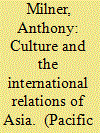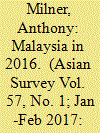| Srl | Item |
| 1 |
ID:
155091


|
|
|
|
|
| Summary/Abstract |
Looking back over the last 30 years, culture as an explanatory factor has been in retreat. Today, however, with the determined reassertion of Islamic values, and an increasingly confident China developing its own international paradigms, the need to investigate cultural and historical specificities is hard to deny. In the Asian region, developments in the South China Sea during 2016 have been especially perplexing for many commentators: International Relations (IR) analysis has come up against a wall of stubborn Chinese and Southeast Asian perspectives. Even some elements in Samuel Huntington ‘civilizations’ approach, widely condemned in the 1990s, today deserve reconsideration – certainly with respect to what Wang Gungwu saw as Huntington's stress on a ‘new language and logic of behaviour’. The common IR analytic framework – highlighting sovereignty, state interests and power (and the balance of power) – needs to be supplemented. Current interest in non-Western IR is promising, especially if it engages in research collaboration with history (particularly the history of ideas, with its focus on close textual analysis). Culture – though certainly in a refined conceptualization – is back.
|
|
|
|
|
|
|
|
|
|
|
|
|
|
|
|
| 2 |
ID:
152257


|
|
|
|
|
| Summary/Abstract |
In 2016 Prime Minister Najib overcame challenges that many predicted would destroy him. The crisis, however, has helped to deepen many of the fault lines in Malaysian politics and society, and to promote public apprehension. Much will now depend on the resilience of the country’s institutions and economy.
|
|
|
|
|
|
|
|
|
|
|
|
|
|
|
|
| 3 |
ID:
160408


|
|
|
|
|
| Summary/Abstract |
The Najib government continued to consolidate its political hold on Malaysia in 2017. Various factors, including a moderately improved economic situation and a relatively generous 2018 budget, suggested that it had good prospects for winning the next election, to be held at the latest in August 2018. Beyond party politics, however, there were indications of deep change taking place in Malaysian society—deep enough to raise questions about the nation’s identity.
|
|
|
|
|
|
|
|
|
|
|
|
|
|
|
|
| 4 |
ID:
074747


|
|
|
|
|
| Publication |
2006.
|
| Summary/Abstract |
This article critically reviews the literature on Track 2 security dialogue in the Asia?Pacific and suggests a number of possible avenues for further research. From almost a standing start, Track 2 security dialogue in this part of the world has burgeoned over the past decade and a half. As these institutions and activities have grown, so too has a body of scholarship grown around them which has striven to stay abreast of them and – at least in the case of some of the more prominent second track institutions and activities – to evaluate their influence and effectiveness. Just as viable second track processes must constantly adapt in response to changes in the regional and global security environment, however, this article contends that the scholarship on Track 2 security dialogue needs now to evolve beyond its heavy emphasis upon on the “success” of these institutions and activities. While this criterion remains vital, the article argues that greater analytical attention should also be given to differentiating between the many and varied Track 2 security processes that are currently active in the Asia-Pacific; to developing a closer understanding as to the operating modalities of these institutions and activities; and to better comprehending longitudinal trends in regional Track 2 security dialogue.
|
|
|
|
|
|
|
|
|
|
|
|
|
|
|
|